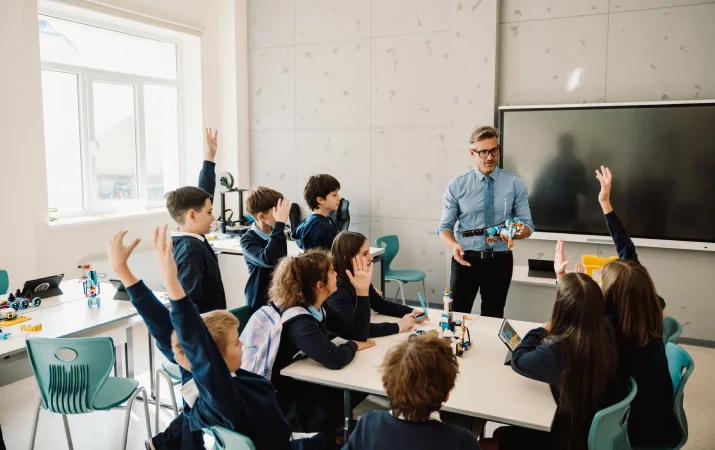How you can work with Aboriginal communities and give back
By Open Universities Australia
Want to support Aboriginal and Torres Strait Islander peoples as part of your career? Here are three jobs to consider, from remote teaching to arts programming.
There are a lot of careers where you can work directly with First Nations communities, not only in remote areas, but also in your local city.
If this is something you’re passionate about, start educating yourself on Aboriginal and Torres Strait Islander history and culture so you can be the best possible partner, and think about where you can offer the most value. Here are three career paths where you can make a real impact.
Close the education gap as a teacher
This Wednesday 1 September marks Indigenous Literacy Day, which was established by the Indigenous Literacy Foundation (ILF) to raise awareness about the educational challenges First Nations children face in remote communities. All week, ILF will be raising money to pay for books and literacy programs in those regions.
You can help close the literacy gap by qualifying as a teacher, and making Aboriginal and Torres Strait Islander cultures a priority in the classroom. You could even spend some time teaching in a remote community.
Why you should consider remote teaching
Remote communities and small towns in the Northern Territory, Western Australia and Queensland regularly need more teachers to work in classrooms where students speak English as a second language.
Going to teach in a remote community can be a life-changing experience, though it’s important to go in knowing you may find the culture shock hard at first. You’ll need to be willing to learn from the community, local First Nations educators and Elders as much as your students will learn from you.
Teach in the Northern Territory has some fantastic advice about what to expect as a remote teacher and how your teaching approach will differ—but for a start, you’ll need to be extremely culturally sensitive, understand that the pace and style of your teaching will change day-to-day, and be aware of the history, family structures and language of your local community.
What to study
To qualify as a teacher, you’ll need a Bachelor of Education (Primary Education) or a Bachelor of Education (Secondary Education). Both degrees offer subjects that explore how to meet the needs of Aboriginal and/or Torres Strait Islander students.
Before you can apply for any teaching jobs, you must pass the Literacy and Numeracy Test for Initial Teacher Education (LANTITE) to prove that you have the knowledge needed to manage a classroom. You’ll also need to register as a teacher with your state or territory’s teaching body (for example, in Victoria this would be the Victorian Institute of Teaching).
Support First Nations projects as a community development worker
If you’re someone who likes to get out into the community, work directly with people and make change happen, then you should think about a career in community development.
But it’s important to understand that your role won’t involve dictating to First Nations groups or managing projects for them. Instead, you’ll help communities identify issues that they’d like to address, and then empower them to lead their own projects.
Why you should consider community development work
This is an incredibly diverse career, where you’ll have the chance to support all sorts of projects as part of a government department or not-for-profit. At World Vision, community development workers give First Nations facilitators the resources they need to run their own early childhood education and youth leadership programs. It’s also common to help communities organise job placement programs, health programs or housing initiatives. Your role is to facilitate meetings, organise resources and write funding applications.
Aboriginal and/or Torres Strait Islander peoples can be understandably sceptical about community service workers, especially those from non-First Nations backgrounds. You’ll need to be patient and sensitive about building relationships over time. If you’re willing to put in the work and support these communities in achieving their goals, then you’ll find it a really rewarding career.
What to study
To become a community development worker, you’ll need a Bachelor of Arts (Community Development), where you’ll learn how to work collaboratively with different communities, plus what works and what doesn’t. If you’re already in the industry or you’d like to go after more senior roles, it can help to earn your Master of Business Administration.
Promote First Nations work as an arts programmer
First Nations Australians are responsible for some of the world's oldest surviving art and culture, with rock art in the Kimberley dating back 50,000 years. Not only is it vital to preserve this rich past, but it’s also important to promote current and future generations of Aboriginal and/or Torres Strait Islander artists so they can continue to have their voices heard.
Unfortunately, First Nations artists are underrepresented in the Australian arts industry, particularly in mainstream venues and arts centres. If you’d like to change that, you can support Aboriginal and Torres Strait Islander equality as an arts programmer.
Why you should consider arts programming and administration
This is a role that involves developing arts programs, initiatives and events that are enjoyed by the whole community. You can champion First Nations artists by ensuring festival, gallery and theatre programs are more inclusive and diverse.
Or you could work in an arts administration role, where you can help secure funding and resources for First Nations arts bodies, ensuring First Nations people are responsible for making decisions about how their work is represented. Those employed by peak bodies like the Australian Council for the Arts for example, organise grants for new arts and culture projects.
Arts organisations are slowly getting better at hiring, interning and funding more First Nations artists, but there’s still a long way to go. Arts programming could be a fantastic career choice for you if you’re like to help drive that movement.
What to study
A Bachelor of Arts, majoring in arts or events management, will give you the skills you need to get involved in arts programming. It also pays to volunteer for arts organisations or festivals, especially those that support First Nations artists. While this is a competitive industry, the right contacts and practical experience can help you stand out from the crowd.
Want to learn more about First Nations culture? Here are some resources
Explore: Gambay: a map of Australia's first languages
Discover the 780+ languages spoken across Australia on this interactive ABC map.Listen: Awaye!
This radio show presents the best of Aboriginal arts and culture every week.Read: Welcome to Country by Marcia Langton
This guidebook offers insights into the different languages, histories and customs of First Nations communities throughout the country.Learn: Speaking Gamilaraay, Aboriginal Art, Indigenous Rights and more
Take a short online subject focusing on anything from law and history to contemporary Aboriginal issues, film, culture and art.
**Open Universities Australia acknowledges the Traditional Owners of the country on which we work, the Bunurong and Wurundjeri people of the Kulin nation, and recognises their continuing connection to the land, waters and culture. We pay our respects to their Elders past, present and emerging.**



